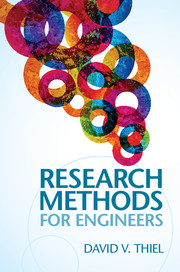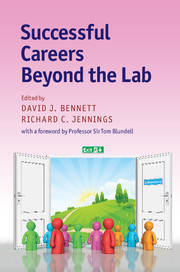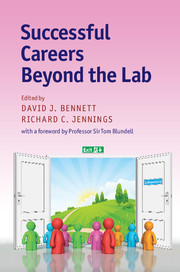How to Succeed as a Scientist
This unique, practical guide for postdoctoral researchers and graduate students explains how to build and perfect the necessary research tools and working skills to build a career in academia and beyond. It is based on successful training workshops run by the authors: first, it describes the tools needed for independent research, from writing papers to applying for academic jobs; it then introduces skills to thrive in a new job, including managing and interacting with others, designing a taught course and giving a good lecture; and it concludes with a section on managing your career, from how to manage stress to understanding the higher education system. Packed with helpful features encouraging readers to apply the theory to their individual situation, the book is also illustrated throughout with real-world case studies to enable readers to learn from others' experience. It is a vital handbook for everyone seeking to make a successful scientific career.
- Concise and clearly structured guide to a range of interdisciplinary research and workplace skills, based on successful training workshops run by the authors
- Includes real-world case studies, enabling postdoctoral researchers and graduate students to learn from the experience of working scientists and avoid pitfalls
- Boxes throughout the text give detailed illustrative information and examples, and 'Pause for Thought' feature gives short tasks to encourage readers to apply the theory to their individual situation
Reviews & endorsements
"This handbook should be useful to many of those students who are not clear which path to follow, or if they have made a choice, what practical steps they can take to improve their chances of success. The book is designed as a concise and easy-to-use reference, covering all the main aspects of developing and maintaining an academic career. The book is exceptionally well organized... the writing is clear and to the point, making frequent use of checklists for later reference. In summary, this is an excellent book which should be useful to its target audience."
William R. Green, North Vancouver, Canada for The Leading Edge
"The authors explicitly target early-career scientists, although I think this book is of use to a wider academic audience... I found the chapters of Part I to be a useful reminder and the clear treatment of complex personal interactions of Part II to be particularly enlightening. At the other end of the career spectrum, this guide will be an excellent aid to academic advisors, especially those willing to organize workshops for early-career scientists."
Spencer Koury, Stony Brook University for The Quarterly Review of Biology
"... provides thoughtful guidelines for anyone who is starting a career as an independent researcher or guiding postdocs through the transition. This book would be an excellent resource for a faculty member planning to give similar seminars for postdoctoral researchers at his or her institution."
Michelle Dolinski, Drexel University for CWSP & COM Gazette
Product details
December 2011Paperback
9780521186834
226 pages
244 × 173 × 10 mm
0.46kg
15 b/w illus. 3 tables
Available
Table of Contents
- Preface
- Part I. Becoming an Independent Researcher:
- 1. Managing your time
- 2. Giving a good research talk
- 3. Writing a quality research paper
- 4. Handling scientific criticism
- 5. Writing grant applications
- 6. Tools for managing research projects
- 7. Is there life beyond academia?
- 8. Applying for a job in academia
- 9. Applying for an independent research fellowship
- Part II. Thriving in Your New Job:
- 10. Handling new roles
- 11. Learning from other people
- 12. Managing people
- 13. Building a research group 1: doctoral students
- 14. Building a research group 2: recruiting and supervising postdocs
- 15. Interacting with others
- 16. Designing a taught course
- 17. Giving a good lecture
- 18. Beyond lecturing
- 19. Mentoring
- Part III. Managing Your Career:
- 20. Managing stress
- 21. Taking on new challenges
- 22. The higher education system
- References
- Index.





